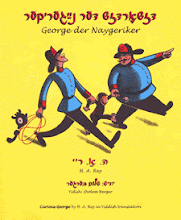The Boy Knows the Truth
Isaac Bashevis Singer (1904-1991)
First printed in the Yiddish journal Di Tsukunft, October, 1972. Reprinted in Di Tsukunft, October, 2004, on the 100th anniversary of Singer's birth. The Tsukunft editors point out that the story has not been included in any anthology in Yiddish, and has never been translated. I'll try to translate a paragraph at a time, whenever I have the time. Expect the translation to be finished, oh, never. Still, it can't hurt to start.
When Reb Gavriel-Takhne became the Klintover rebbe on the death of his father, he told his attendants that he would not receive women. It was true that his own father and grandfather, and many other rebbes, like Reb Sholem of Belz and Reb Khayim of Sanz, did receive women, but he couldn't compare himself to those righteous men. They were angels; he, Gavriel-Takhne, was a man of bodily needs. His blood boiled in him. In the middle of prayer inappropriate thoughts would attack him like locusts. Fasts and cold mikvahs didn't help. The evil inclination spoke to him without any scruples: anything goes, get some while you still can. From anguish the rebbe bit his nails to the quick. He pounded his head with his fists, tore his sidelocks, called himself an evil man, disgusting, a sinner. He looked for advice in religious works, but it turned out, strangely enough, that an evil spirit had attached himself to him. How ridiculous! Young men visited him to learn how to be God-fearing; scholars copied his words of Torah; he taught Talmud daily to yeshivah students; was ashamed before other people more than before God . . .
"This is a world of falsehood, anyway," said the rebbe to himself. Here, in the world of demons, everything was backwards. Countless times Reb Gavriel-Takhne had wanted to call together those close to him and tell them the truth: he couldn't be a leader of Jews. But the rebbe knew that as soon as he took off the spodik and the felt coat, he would immediately come under the Devil's control. The way things were, at least, he hadn't progressed to any actual sin.
He kept having the same thought. A man like him, Gavriel-Takhne, is ashamed before other people more than before God.
The rebbe would look into "The Beginning of Wisdom" and think about Rahab the prostitute; he would study the Zohar and lust after Avishag the Shunamite and Queen Esther. It said in works of Kabbalah that new personalities would spring up between Adam and Eve, Jacob and Rachel, David and Batsheba. In this case, they meant souls, not bodies. But as soon as the rebbe fell asleep, the bodies of those righteous women would reveal themselves to him naked. He would cavort with them like a he-goat. They'd sing different songs and uncover their shame. The rebbe got up trembling.
"Help, please help! I can't take it any more!"
The rebbe had a wife, a descendant of the Roptshitser rebbe, Menukhe-Alte. But as much as he was a man of lust, she was someone of whom it's said "even her pregnancy and giving birth are in holiness." He, Gavriel-Takhne, is tall, broad, with the voice of a strongman and the appetite of an animal. At fifty-seven his beard was still as red as fire, without a thread of gray. He had all his teeth. He could crack walnuts with them. One time, during a fire in his courtyard, Gavriel-Takhne tore locks open with his bare hands, carried out whole cases of holy books. He grabbed Avigdor the sexton, who had passed out from the smoke, and carried him down two flights of stairs. Then the rebbe went out to the well and for two hours straight drew buckets of water which the firefighters used to put out the fire.
Subscribe to:
Post Comments (Atom)








No comments:
Post a Comment